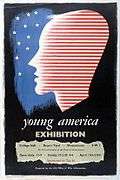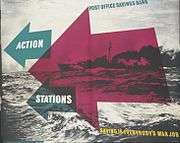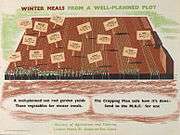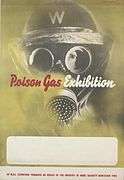Henri Kay Henrion
Frederick Henri Kay Henrion (born Heinrich Fritz Kohn, Nuremberg, Germany) (1914–1990), was a German graphic designer. A celebrated poster and exhibition designer, Henrion was also the founding father of modern European corporate identity.
Early career
After leaving school, Henrion went to Paris, and worked in textile design before studying with poster designer Paul Colin. In 1936 he moved to London, England where he set up his studio.[1]
World War II
During the Second World War Henrion was interned on the Isle of Man as an alien, but subsequently worked for the Ministry of Information and the US Office of War Information, designing posters for campaigns like Dig for Victory, Aid the Wounded, and Grow More Food.[2]
Corporate Identity

After the war Henrion became art director at Contact Books, and in 1951 he started his own design consultancy named Henrion Design Associates.[3] As well as creating exhibitions, packaging, and book and magazine design, they worked within the then-emerging concept of corporate identity - with Henrion becoming a pioneer in the field.
His clients included:
- British European Airways
- Blue Circle Cement
- Coopers & Lybrand
- Giro
- KLM
- London Electricity Board
- The Post Office.[4]
- The National Theatre
- Tate & Lyle
- Wates[5]
Exhibition Design
Alongside his poster, packaging and advertising design work, Henrion was involved in the design of many exhibitions around the world. These included the Publicity Pavilion for the Paris International Fair, and the MARS (Modern Architectural Research Society) exhibition in London. He also worked on projects for the 1938 Glasgow Empire Exhibition, the 1939 New York World's Fair, and the Air France pavilion at the Tel Aviv Levant Fair, 1940,[1]
After the war, Henrion continued to develop a reputation as an exhibition designer.[6] He designed two of the pavilions at the 1951 Festival of Britain; The Country and The Natural Scene.
Henrion as an Educator
Henrion lectured at the Royal College of Art from 1955 to 1965, and was head of Visual Communication at the London College of Printing from 1976 to 1979.[7] He also worked as an art editor for various publications, and contributed to the Council for Industrial Design's Design magazine.[8]
Affiliations and awards
Henrion was a member of the Artists' International Association, the Society of Industrial Artists and Designers (later the Chartered Society of Designers), and the Council of Industrial Design; in 1952 he became one of the earliest members of Alliance Graphique Internationale, in which designers from all over the world could meet and share ideas.
He was elected a Royal Designer for Industry in 1959, and was appointed MBE in 1951, OBE in 1985.[2]
Henrion was closely involved with design institutions such as the Council of Industrial Design (later the Design Council) and ICOGRADA (International Council of Graphic Design Associations).
Personal life
Henrion married the British sculptor Daphne Hardy in 1947. Together they had two sons and a daughter. They separated in the 1970s.
Henrion's Archive and Library
Henrion's archive is held at The University of Brighton Design Archives. It covers his entire career and comprises correspondence with clients, original artwork, examples of packaging and graphic design and photography. It also includes Henrion's personal library of books on graphic and industrial design, typography and advertising, which is now fully searchable on the University's Library system.
Photographs of Henrion's work featured at the Britain Can Make It Exhibition (1946) and The Festival of Britain (1951), have been made available on the Visual Arts Data Service (VADS), along with examples of his Wartime posters.
Gallery
 Profile of a young man in red stripes against a blue background Wellcome L0026427
Profile of a young man in red stripes against a blue background Wellcome L0026427 Action Stations Art.IWMPST16460
Action Stations Art.IWMPST16460 His Needs Come First Art.IWMPST16454
His Needs Come First Art.IWMPST16454 Winter Meals from a Well-planned Plot Art.IWMPST17019
Winter Meals from a Well-planned Plot Art.IWMPST17019 Poison Gas Exhibition Art.IWMPST3682
Poison Gas Exhibition Art.IWMPST3682
References
- "Frederick Henri Kay Henrion". German Graphic Designers. Retrieved 25 May 2016.
- Gentleman, David (Sep 2004). Henrion, (Frederick) Henri Kay (1914–1990). Oxford Dictionary of National Biography. Oxford University Press.
- "Heroes: FHK Henrion". Designers Journal. Retrieved 25 May 2016.
- Wainwright, David (1967). "Red Letter Days for the Post Office". Design Journal: 32–35.
- "FHK Henrion: graphics as propaganda in World War II". Woudhuysen. Retrieved 25 May 2016.
- "FHK Henrion Acrhive". The Archives Hub. Retrieved 25 May 2016.
- "London Transport museum poster collection".
- "FHK Henrion". Archives Portal Europe. Retrieved 25 May 2016.